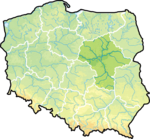Cumann Warsaw
2009 establishments in PolandGaelic Athletic Association club stubsGaelic Athletic Association clubs established in 2009Gaelic football clubs in EuropeHurling clubs in Europe ... and 3 more
Polish sports team stubsSport in WarsawSports teams in Poland
Cumann Warsaw (Cumann Warszawa) is a GAA club in Warsaw, Poland. The club has joint hurling and Gaelic football sessions once a week at Pole Mokotowskie, with winter training taking place indoors at the nearby Stadion Skra.
Excerpt from the Wikipedia article Cumann Warsaw (License: CC BY-SA 3.0, Authors).Cumann Warsaw
Rokitnicka, Warsaw Ochota (Warsaw)
Geographical coordinates (GPS) Address Nearby Places Show on map
Geographical coordinates (GPS)
| Latitude | Longitude |
|---|---|
| N 52.211 ° | E 20.994 ° |
Address
Pomnik Szczęśliwego Psa
Rokitnicka
02-131 Warsaw, Ochota (Warsaw)
Masovian Voivodeship, Poland
Open on Google Maps











